The Cambridge History of China. Vol. 13: Republican China 1912-1949, Part 2
Подождите немного. Документ загружается.

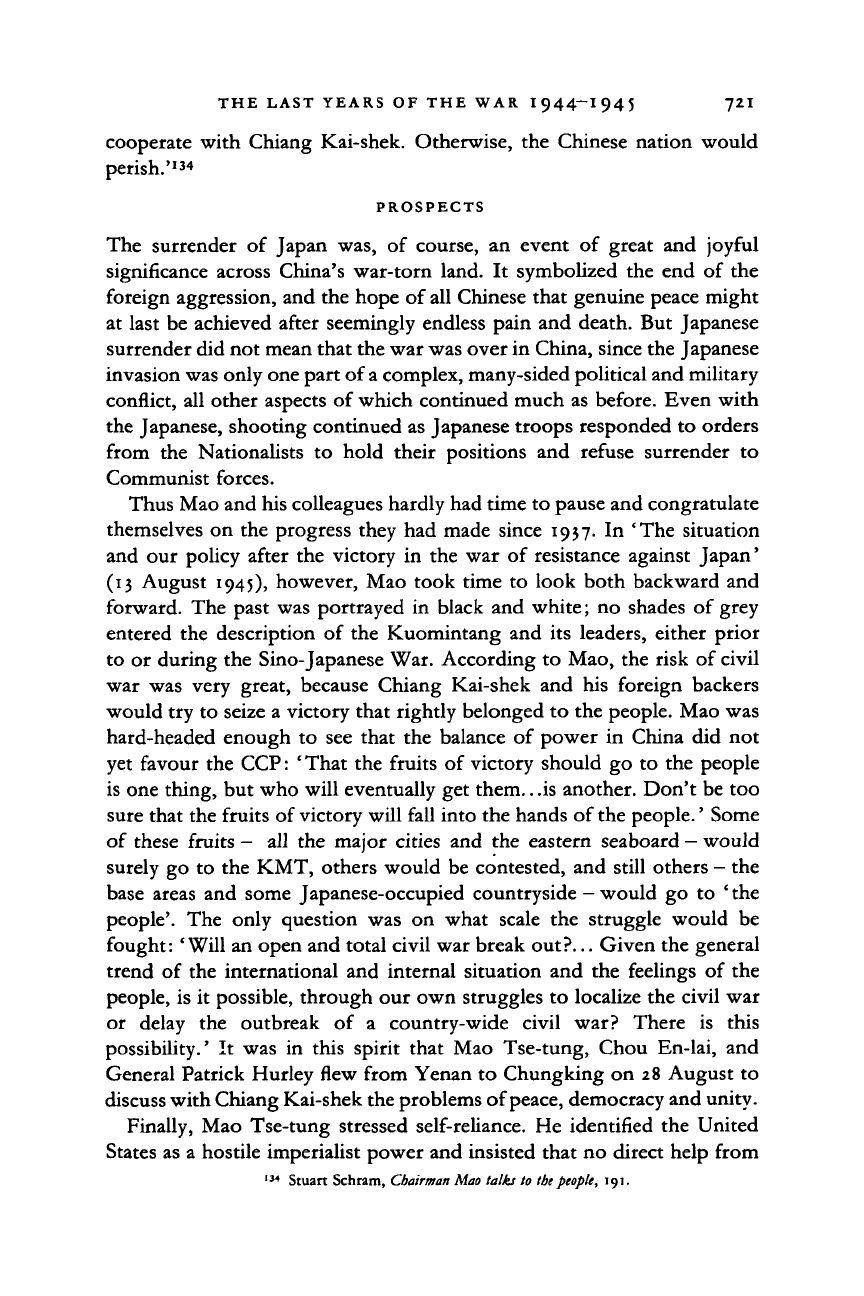
THE LAST YEARS OF THE WAR I944-1945 721
cooperate with Chiang Kai-shek. Otherwise,
the
Chinese nation would
perish.'
134
PROSPECTS
The surrender
of
Japan
was, of
course,
an
event
of
great
and
joyful
significance across China's war-torn land.
It
symbolized
the end of the
foreign aggression,
and the
hope
of
all Chinese that genuine peace might
at last
be
achieved after seemingly endless pain
and
death.
But
Japanese
surrender did
not
mean that the war was over in China, since the Japanese
invasion was only one part
of
a
complex, many-sided political and military
conflict,
all
other aspects
of
which continued much
as
before. Even with
the Japanese, shooting continued
as
Japanese troops responded
to
orders
from
the
Nationalists
to
hold their positions
and
refuse surrender
to
Communist forces.
Thus Mao and his colleagues hardly had time
to
pause and congratulate
themselves
on the
progress they
had
made since 1937.
In 'The
situation
and
our
policy after
the
victory
in the war of
resistance against Japan'
(13 August 1945), however,
Mao
took time
to
look both backward
and
forward.
The
past
was
portrayed
in
black
and
white;
no
shades
of
grey
entered
the
description
of the
Kuomintang
and its
leaders, either prior
to
or
during
the
Sino-Japanese War. According
to
Mao,
the
risk
of
civil
war
was
very great, because Chiang Kai-shek
and his
foreign backers
would
try to
seize
a
victory that rightly belonged
to the
people. Mao
was
hard-headed enough
to see
that
the
balance
of
power
in
China
did not
yet favour
the
CCP: ' That
the
fruits
of
victory should
go to the
people
is
one
thing,
but
who will eventually
get
them.. .is another. Don't
be too
sure that
the
fruits
of
victory will fall into
the
hands
of
the people.' Some
of these fruits
—
all the
major cities
and the
eastern seaboard
—
would
surely
go to the
KMT, others would
be
contested,
and
still others
- the
base areas
and
some Japanese-occupied countryside
-
would
go to '
the
people'.
The
only question
was on
what scale
the
struggle would
be
fought: 'Will
an
open
and
total civil war break out?... Given
the
general
trend
of the
international
and
internal situation
and the
feelings
of the
people,
is it
possible, through
our
own struggles
to
localize
the
civil
war
or delay
the
outbreak
of a
country-wide civil war? There
is
this
possibility.'
It was in
this spirit that
Mao
Tse-tung, Chou En-lai,
and
General Patrick Hurley flew from Yenan
to
Chungking
on 28
August
to
discuss with Chiang Kai-shek the problems of peace, democracy and unity.
Finally,
Mao
Tse-tung stressed self-reliance.
He
identified
the
United
States
as a
hostile imperialist power
and
insisted that
no
direct help from
134
Stuart Schram, Chairman Mao talks
to
the people, 191.
Cambridge Histories Online © Cambridge University Press, 2008
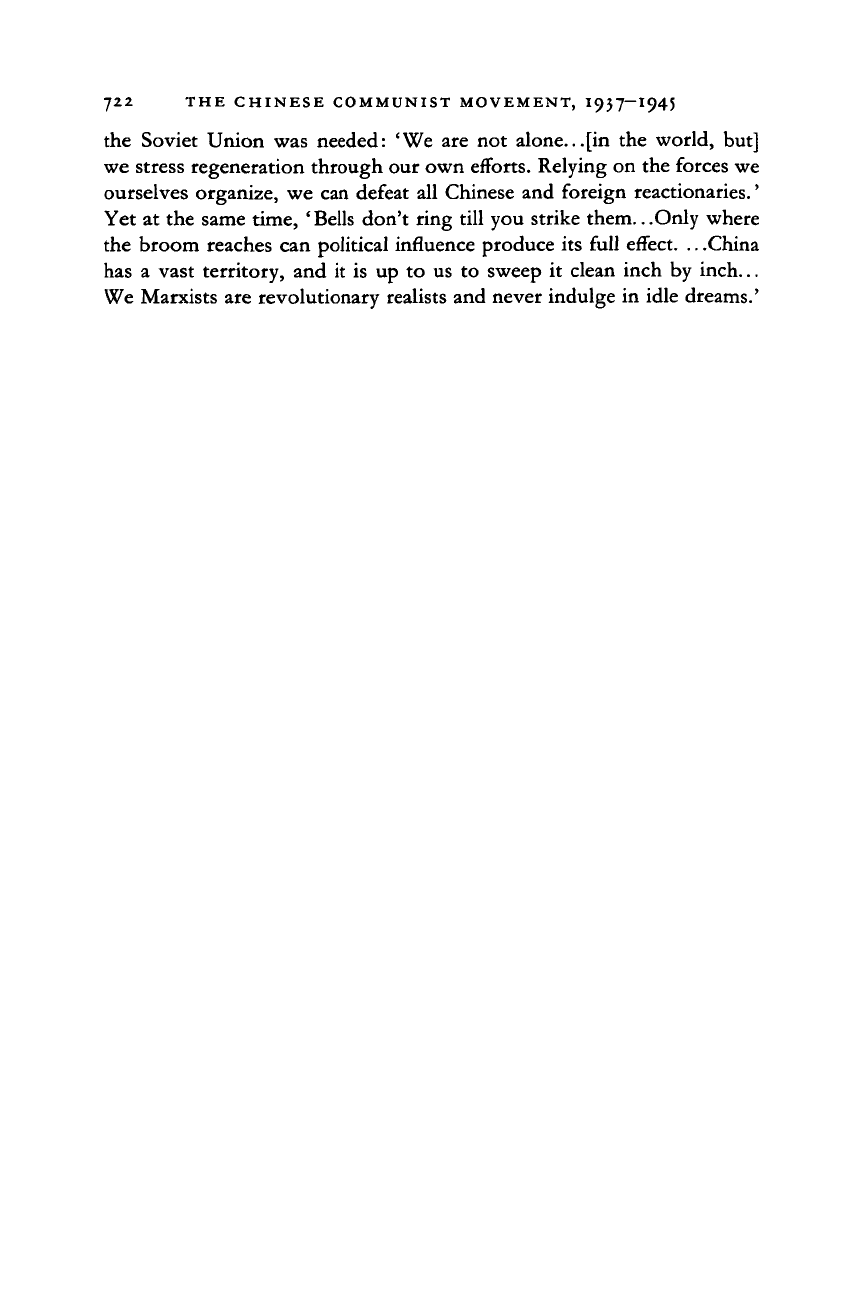
722 THE CHINESE COMMUNIST MOVEMENT, I937—1945
the Soviet Union was needed: 'We are not alone...[in the world, but]
we stress regeneration through our own efforts. Relying on the forces we
ourselves organize, we can defeat all Chinese and foreign reactionaries.'
Yet at the same time, 'Bells don't ring till you strike them...Only where
the broom reaches can political influence produce its full effect. .. .China
has a vast territory, and it is up to us to sweep it clean inch by inch...
We Marxists are revolutionary realists and never indulge in idle dreams.'
Cambridge Histories Online © Cambridge University Press, 2008
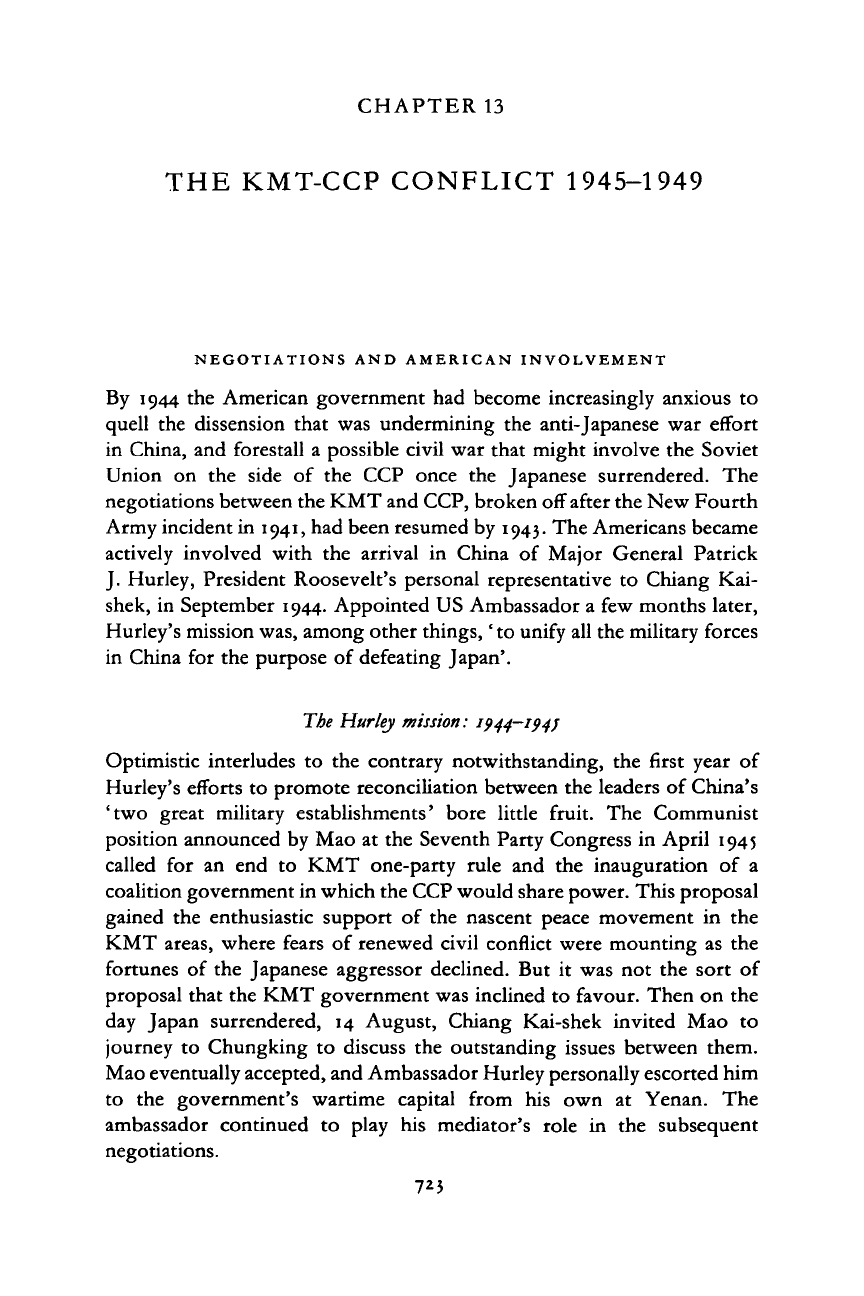
CHAPTER
13
THE KMT-CCP CONFLICT 1945-1949
NEGOTIATIONS AND AMERICAN INVOLVEMENT
By 1944 the American government had become increasingly anxious
to
quell the dissension that was undermining the anti-Japanese war effort
in China, and forestall a possible civil war that might involve the Soviet
Union
on
the side
of
the CCP once the Japanese surrendered. The
negotiations between the KMT and CCP, broken off after the New Fourth
Army incident in
1941,
had been resumed by 1943. The Americans became
actively involved with the arrival
in
China
of
Major General Patrick
J. Hurley, President Roosevelt's personal representative to Chiang Kai-
shek, in September 1944. Appointed US Ambassador a few months later,
Hurley's mission was, among other things,' to unify all the military forces
in China for the purpose of defeating Japan'.
The Hurley mission: 1944-194j
Optimistic interludes to the contrary notwithstanding, the first year of
Hurley's efforts to promote reconciliation between the leaders of China's
'two great military establishments' bore little fruit. The Communist
position announced by Mao at the Seventh Party Congress in April 1945
called for an end
to
KMT one-party rule and the inauguration
of a
coalition government in which the CCP would share power. This proposal
gained the enthusiastic support
of
the nascent peace movement
in
the
KMT areas, where fears of renewed civil conflict were mounting as the
fortunes of the Japanese aggressor declined. But
it
was not the sort of
proposal that the KMT government was inclined to favour. Then on the
day Japan surrendered, 14 August, Chiang Kai-shek invited Mao
to
journey to Chungking to discuss the outstanding issues between them.
Mao eventually accepted, and Ambassador Hurley personally escorted him
to
the
government's wartime capital from
his
own
at
Yenan.
The
ambassador continued
to
play his mediator's role
in
the subsequent
negotiations.
7
2
3
Cambridge Histories Online © Cambridge University Press, 2008
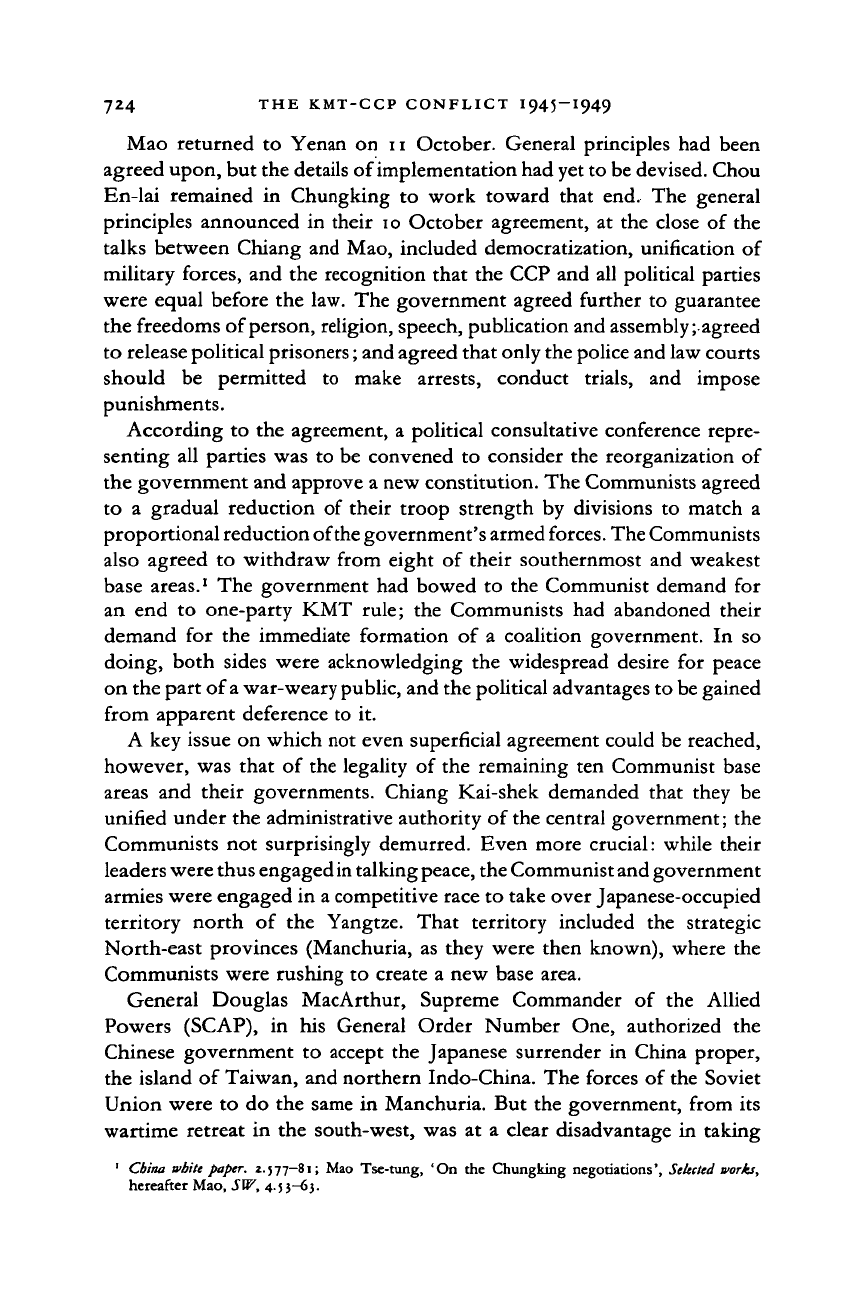
724
THE
KMT-CCP CONFLICT I945-I949
Mao returned
to
Yenan
on n
October. General principles had been
agreed upon, but the details of implementation had yet to be devised. Chou
En-lai remained
in
Chungking
to
work toward that end. The general
principles announced
in
their 10 October agreement,
at
the close
of
the
talks between Chiang and Mao, included democratization, unification of
military forces, and the recognition that the CCP and all political parties
were equal before the law. The government agreed further
to
guarantee
the freedoms of person, religion, speech, publication and assembly ;• agreed
to release political prisoners; and agreed that only the police and law courts
should
be
permitted
to
make arrests, conduct trials,
and
impose
punishments.
According to the agreement,
a
political consultative conference repre-
senting all parties was to be convened
to
consider the reorganization of
the government and approve a new constitution. The Communists agreed
to
a
gradual reduction
of
their troop strength
by
divisions
to
match
a
proportional reduction of
the
government's armed forces. The Communists
also agreed
to
withdraw from eight
of
their southernmost and weakest
base areas.' The government had bowed
to
the Communist demand
for
an end
to
one-party KMT rule; the Communists had abandoned their
demand
for
the immediate formation
of a
coalition government.
In so
doing, both sides were acknowledging the widespread desire
for
peace
on the part of a war-weary
public,
and the political advantages to be gained
from apparent deference to
it.
A key issue on which not even superficial agreement could be reached,
however, was that
of
the legality
of
the remaining ten Communist base
areas and their governments. Chiang Kai-shek demanded that they
be
unified under the administrative authority of the central government; the
Communists not surprisingly demurred. Even more crucial: while their
leaders were thus engaged
in
talking
peace,
the Communist and government
armies were engaged in a competitive race to take over Japanese-occupied
territory north
of the
Yangtze. That territory included
the
strategic
North-east provinces (Manchuria, as they were then known), where the
Communists were rushing to create
a
new base area.
General Douglas MacArthur, Supreme Commander
of the
Allied
Powers (SCAP),
in his
General Order Number One, authorized
the
Chinese government
to
accept the Japanese surrender
in
China proper,
the island
of
Taiwan, and northern Indo-China. The forces of the Soviet
Union were
to
do the same in Manchuria. But the government, from its
wartime retreat in the south-west, was
at a
clear disadvantage
in
taking
1
China white
paper. 2.577-81; Mao Tse-tung, 'On the Chungking negotiations',
Selected
works,
hereafter Mao, SW, 4.53-63.
Cambridge Histories Online © Cambridge University Press, 2008
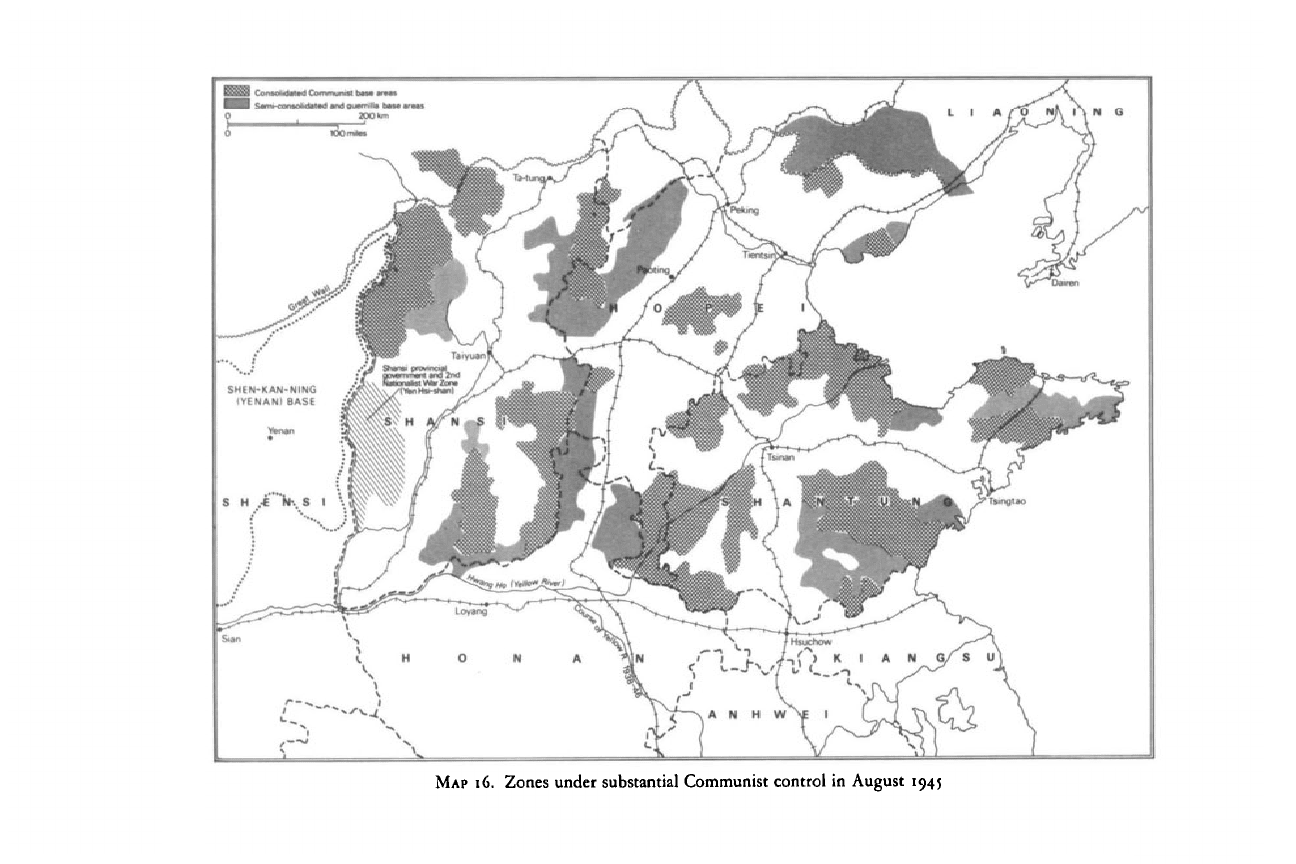
a\
*-i
V>
3
00
3
<
C
~5
v-
C
o
D
Vi
'H
3
E
E
o
u
c
M
(fl
-O
3
(A
hi
u
-o
c
3
so
U
c
o
N
fi.
<
2
3
III
i
8
H
|1
-8
If
.
5
I
JI
^1
o-
o
O
UJ
Z
(A
*
<
.
±5
^1
Cambridge Histories Online © Cambridge University Press, 2008
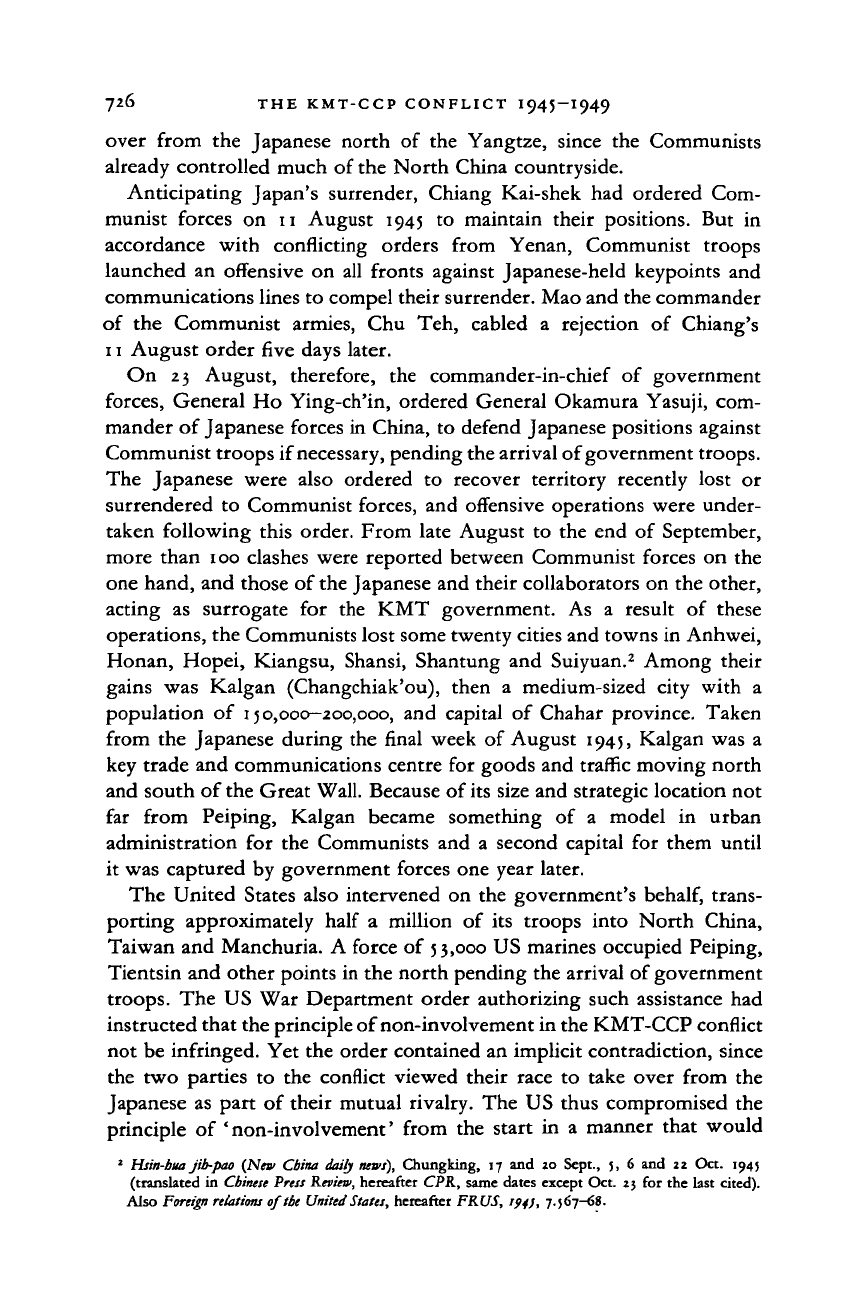
7*6 THE KMT-CCP CONFLICT I945-I949
over from
the
Japanese north
of
the Yangtze, since
the
Communists
already controlled much of the North China countryside.
Anticipating Japan's surrender, Chiang Kai-shek had ordered Com-
munist forces
on 11
August 1945
to
maintain their positions.
But in
accordance with conflicting orders from Yenan, Communist troops
launched
an
offensive
on
all fronts against Japanese-held keypoints and
communications lines to compel their surrender. Mao and the commander
of
the
Communist armies,
Chu
Teh, cabled
a
rejection
of
Chiang's
11 August order five days later.
On
23
August, therefore,
the
commander-in-chief
of
government
forces, General Ho Ying-ch'in, ordered General Okamura Yasuji, com-
mander of Japanese forces in China, to defend Japanese positions against
Communist troops if necessary, pending the arrival of government troops.
The Japanese were also ordered
to
recover territory recently lost
or
surrendered
to
Communist forces, and offensive operations were under-
taken following this order. From late August
to
the end
of
September,
more than 100 clashes were reported between Communist forces on the
one hand, and those of the Japanese and their collaborators on the other,
acting
as
surrogate
for the
KMT government.
As a
result
of
these
operations, the Communists lost some twenty cities and towns in Anhwei,
Honan, Hopei, Kiangsu, Shansi, Shantung and Suiyuan.
2
Among their
gains
was
Kalgan (Changchiak'ou), then
a
medium-sized city with
a
population
of
150,000—200,000, and capital
of
Chahar province. Taken
from the Japanese during the final week
of
August 1945, Kalgan was
a
key trade and communications centre for goods and traffic moving north
and south of the Great Wall. Because of its size and strategic location not
far from Peiping, Kalgan became something
of a
model
in
urban
administration
for
the Communists and
a
second capital
for
them until
it was captured by government forces one year later.
The United States also intervened on the government's
behalf,
trans-
porting approximately half
a
million
of
its troops into North China,
Taiwan and Manchuria. A force
of
53,000 US marines occupied Peiping,
Tientsin and other points in the north pending the arrival of government
troops. The US War Department order authorizing such assistance had
instructed that the principle of non-involvement in the KMT-CCP conflict
not be infringed. Yet the order contained an implicit contradiction, since
the two parties
to
the conflict viewed their race
to
take over from the
Japanese as part
of
their mutual rivalry. The US thus compromised the
principle
of
'non-involvement' from the start
in a
manner that would
2
Hsia-hua jib-pao
(New
China daily news), Chungking,
17 and 20
Sept.,
5, 6 and 22 Oct. 1945
(translated
in
Chinese Press Review, hereafter
CPR,
same dates except Oct.
23
for the last cited).
Also Foreign relations of
the
United States, hereafter FRUS, 194}, 7.567-68.
Cambridge Histories Online © Cambridge University Press, 2008
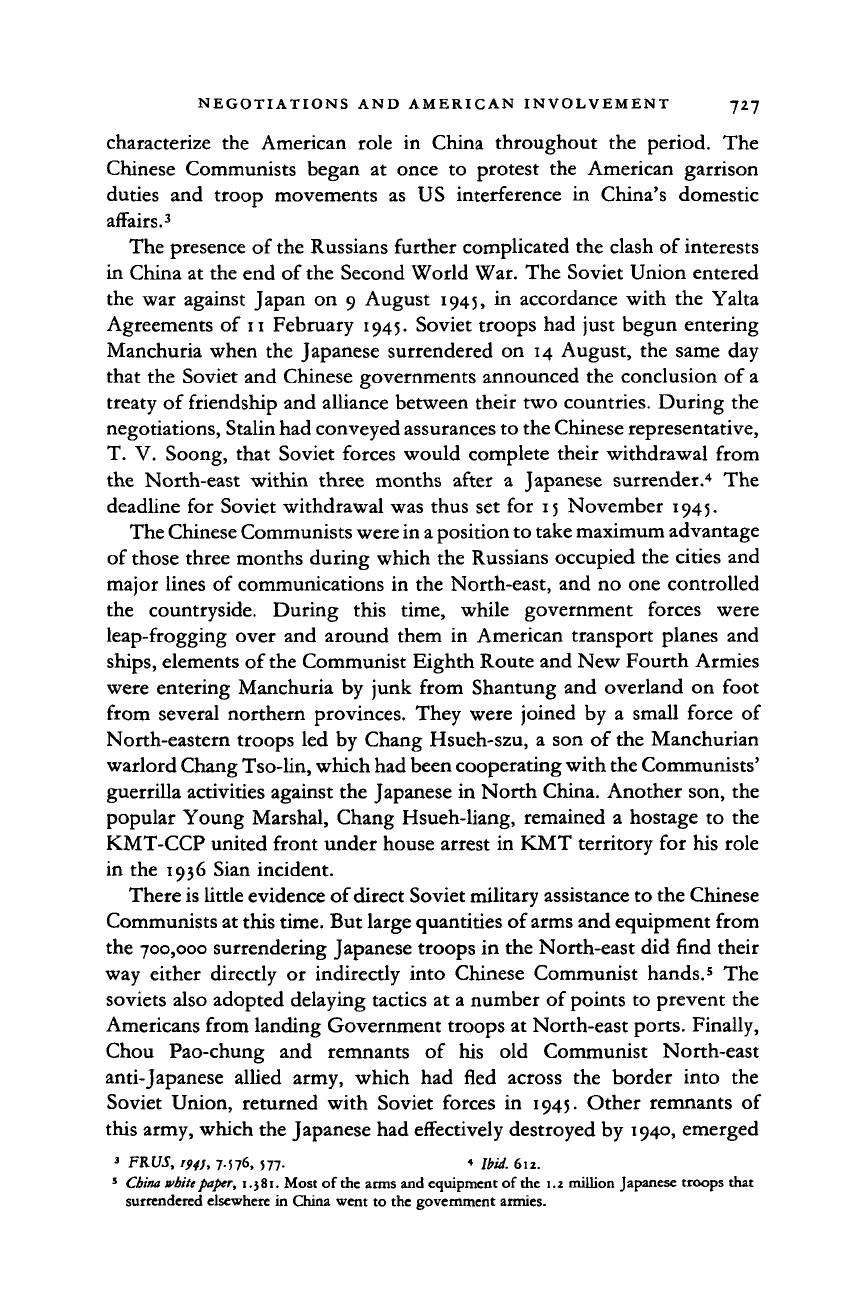
NEGOTIATIONS AND AMERICAN INVOLVEMENT 727
characterize
the
American role
in
China throughout
the
period.
The
Chinese Communists began
at
once
to
protest
the
American garrison
duties
and
troop movements
as US
interference
in
China's domestic
affairs.
3
The presence
of
the Russians further complicated
the
clash
of
interests
in China
at
the end
of
the Second World War.
The
Soviet Union entered
the
war
against Japan
on 9
August 1945,
in
accordance with
the
Yalta
Agreements
of
11
February 1945. Soviet troops
had
just begun entering
Manchuria when
the
Japanese surrendered
on 14
August,
the
same
day
that
the
Soviet
and
Chinese governments announced
the
conclusion
of
a
treaty
of
friendship and alliance between their two countries. During
the
negotiations, Stalin had conveyed assurances to the Chinese representative,
T.
V.
Soong, that Soviet forces would complete their withdrawal from
the North-east within three months after
a
Japanese surrender.
4
The
deadline
for
Soviet withdrawal was thus
set for
15 November 1945.
The Chinese Communists were in
a
position to take maximum advantage
of those three months during which
the
Russians occupied the cities
and
major lines
of
communications
in the
North-east,
and no one
controlled
the countryside. During this time, while government forces were
leap-frogging over
and
around them
in
American transport planes
and
ships,
elements
of
the Communist Eighth Route and New Fourth Armies
were entering Manchuria
by
junk from Shantung
and
overland
on
foot
from several northern provinces. They were joined
by a
small force
of
North-eastern troops
led by
Chang Hsueh-szu,
a son of
the Manchurian
warlord Chang Tso-lin, which had been cooperating with the Communists'
guerrilla activities against the Japanese
in
North China. Another son,
the
popular Young Marshal, Chang Hsueh-liang, remained
a
hostage
to the
KMT-CCP united front under house arrest
in
KMT territory
for
his role
in
the
1936 Sian incident.
There is little evidence of direct Soviet military assistance to the Chinese
Communists at this time. But large quantities of arms and equipment from
the 700,000 surrendering Japanese troops
in
the North-east
did
find their
way either directly
or
indirectly into Chinese Communist hands.
5
The
Soviets also adopted delaying tactics
at a
number
of
points
to
prevent
the
Americans from landing Government troops
at
North-east ports. Finally,
Chou Pao-chung
and
remnants
of his old
Communist North-east
anti-Japanese allied army, which
had
fled across
the
border into
the
Soviet Union, returned with Soviet forces
in
1945. Other remnants
of
this army, which the Japanese had effectively destroyed
by
1940, emerged
3
FRUS,
rw,
7.576,
577. 4
MM.
611.
5
China
white paper, 1.381. Most
of
the arms and equipment
of
the
1.2
million Japanese troops that
surrendered elsewhere
in
China went
to
the government armies.
Cambridge Histories Online © Cambridge University Press, 2008
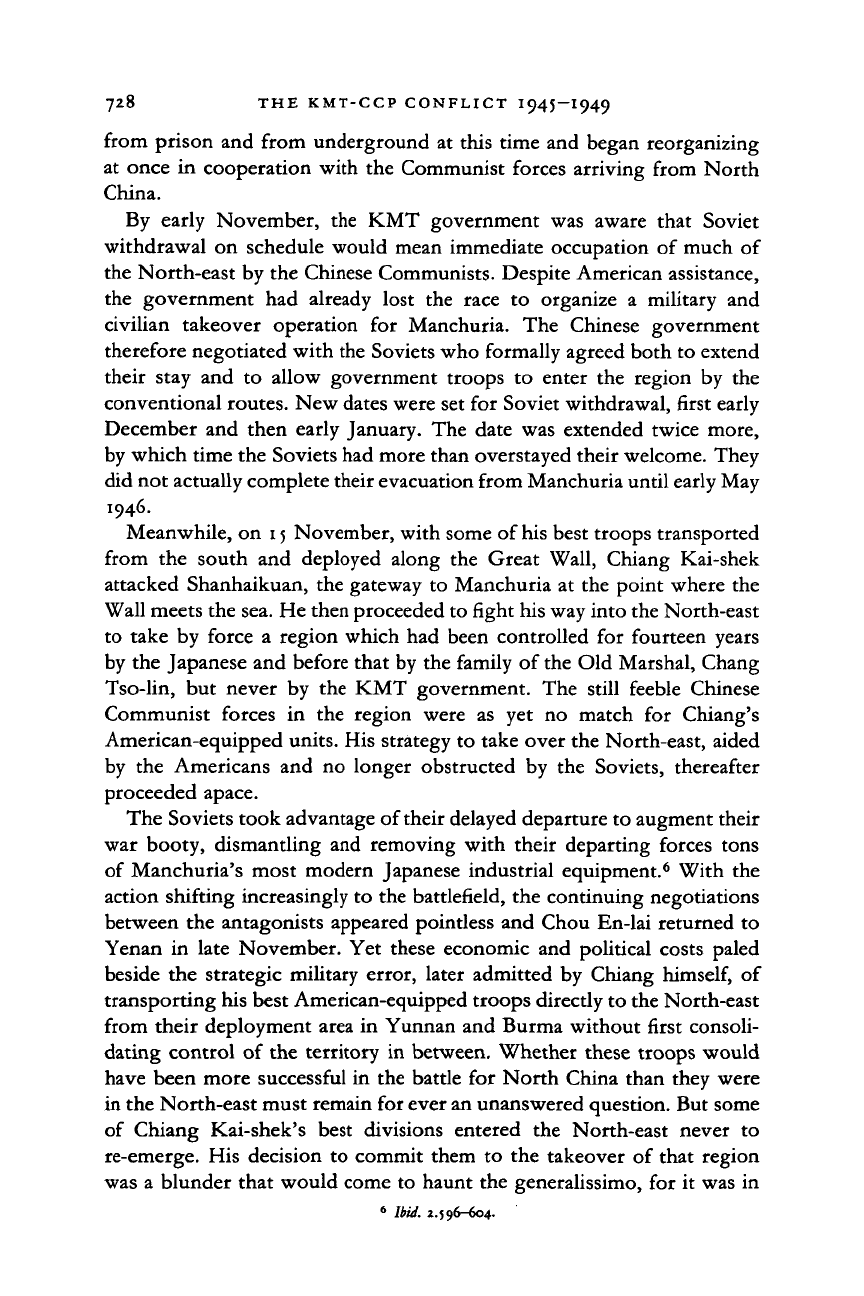
728 THE KMT-CCP CONFLICT I945-I949
from prison and from underground
at
this time and began reorganizing
at once
in
cooperation with the Communist forces arriving from North
China.
By early November,
the
KMT government was aware that Soviet
withdrawal
on
schedule would mean immediate occupation
of
much of
the North-east by the Chinese Communists. Despite American assistance,
the government
had
already lost
the
race
to
organize
a
military
and
civilian takeover operation
for
Manchuria.
The
Chinese government
therefore negotiated with the Soviets who formally agreed both to extend
their stay and
to
allow government troops
to
enter the region
by the
conventional routes. New dates were set for Soviet withdrawal, first early
December and then early January. The date was extended twice more,
by which time the Soviets had more than overstayed their welcome. They
did not actually complete their evacuation from Manchuria until early May
1946.
Meanwhile, on 15 November, with some of
his
best troops transported
from
the
south and deployed along
the
Great Wall, Chiang Kai-shek
attacked Shanhaikuan, the gateway
to
Manchuria at the point where the
Wall meets the sea. He then proceeded to fight his way into the North-east
to take
by
force
a
region which had been controlled
for
fourteen years
by the Japanese and before that by the family of the Old Marshal, Chang
Tso-lin,
but
never
by
the KMT government. The still feeble Chinese
Communist forces
in the
region were
as yet no
match
for
Chiang's
American-equipped units. His strategy to take over the North-east, aided
by
the
Americans and
no
longer obstructed
by
the Soviets, thereafter
proceeded apace.
The Soviets took advantage of their delayed departure to augment their
war booty, dismantling and removing with their departing forces tons
of Manchuria's most modern Japanese industrial equipment.
6
With the
action shifting increasingly to the battlefield, the continuing negotiations
between the antagonists appeared pointless and Chou En-lai returned
to
Yenan
in
late November. Yet these economic and political costs paled
beside the strategic military error, later admitted by Chiang
himself,
of
transporting his best American-equipped troops directly to the North-east
from their deployment area in Yunnan and Burma without first consoli-
dating control
of
the territory in between. Whether these troops would
have been more successful in the battle for North China than they were
in the North-east must remain for ever an unanswered question. But some
of Chiang Kai-shek's best divisions entered
the
North-east never
to
re-emerge. His decision
to
commit them
to
the takeover
of
that region
was
a
blunder that would come to haunt the generalissimo, for
it
was
in
6
Ibid.
2.596-604.
Cambridge Histories Online © Cambridge University Press, 2008
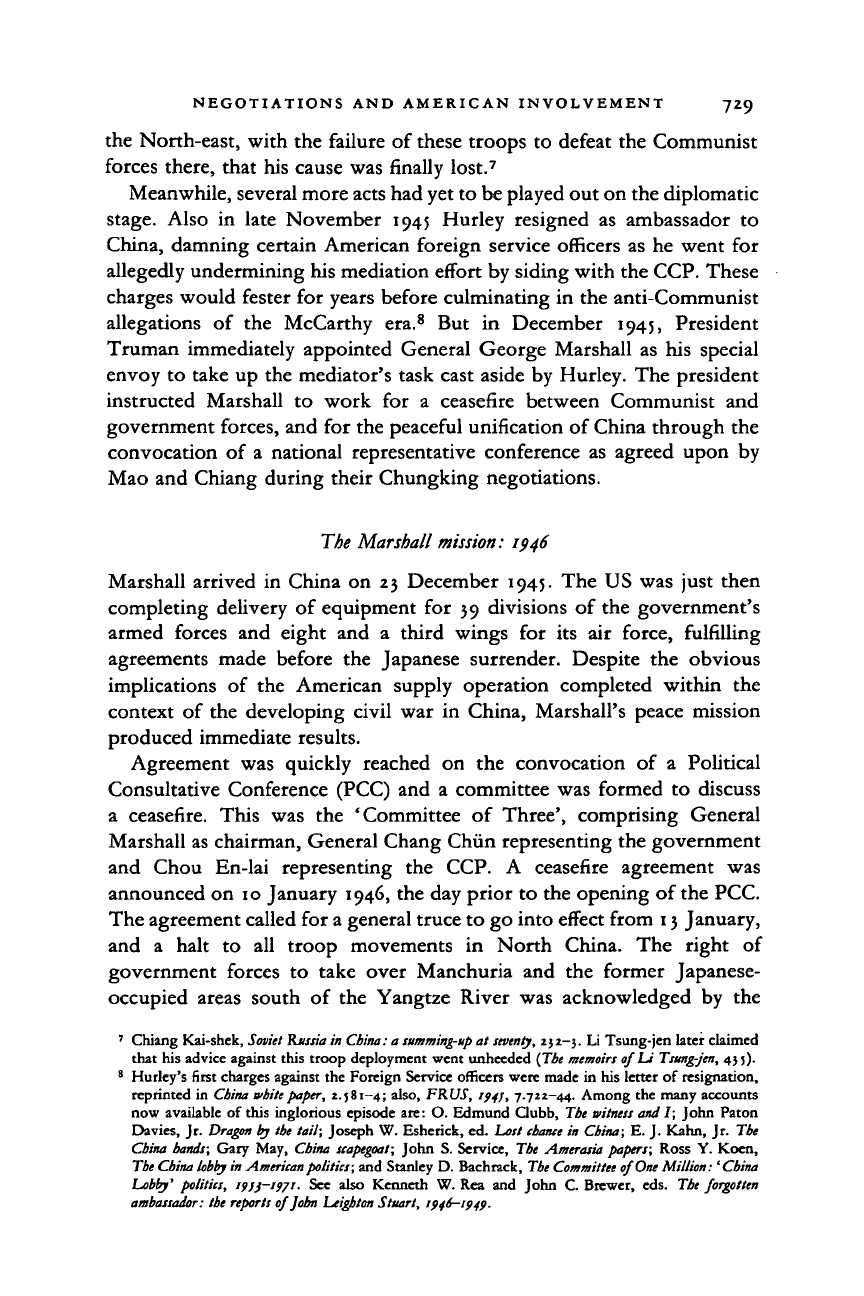
NEGOTIATIONS AND AMERICAN INVOLVEMENT 729
the North-east, with the failure of these troops to defeat the Communist
forces there, that his cause was finally lost.
7
Meanwhile, several more acts had yet to be played out on the diplomatic
stage. Also in late November 1945 Hurley resigned as ambassador to
China, damning certain American foreign service officers as he went for
allegedly undermining his mediation effort by siding with the CCP. These
charges would fester for years before culminating in the anti-Communist
allegations of the McCarthy era.
8
But in December 1945, President
Truman immediately appointed General George Marshall as his special
envoy to take up the mediator's task cast aside by Hurley. The president
instructed Marshall to work for a ceasefire between Communist and
government forces, and for the peaceful unification of China through the
convocation of a national representative conference as agreed upon by
Mao and Chiang during their Chungking negotiations.
The Marshall mission: 1946
Marshall arrived in China on 23 December 1945. The US was just then
completing delivery of equipment for 39 divisions of the government's
armed forces and eight and a third wings for its air force, fulfilling
agreements made before the Japanese surrender. Despite the obvious
implications of the American supply operation completed within the
context of the developing civil war in China, Marshall's peace mission
produced immediate results.
Agreement was quickly reached on the convocation of a Political
Consultative Conference (PCC) and a committee was formed to discuss
a ceasefire. This was the 'Committee of Three', comprising General
Marshall as chairman, General Chang Chun representing the government
and Chou En-lai representing the CCP. A ceasefire agreement was
announced on 10 January 1946, the day prior to the opening of the PCC.
The agreement called for a general truce to go into effect from 13 January,
and a halt to all troop movements in North China. The right of
government forces to take over Manchuria and the former Japanese-
occupied areas south of the Yangtze River was acknowledged by the
' Chiang Kai-shek, Soviet Russia in China: a
summing-up
at
seventy,
232—3. Li Tsung-jen later claimed
that his advice against this troop deployment went unheeded (Tbe memoirs of U Tsung-jen, 4} 5).
8
Hurley's first charges against the Foreign Service officers were made in his letter of resignation,
reprinted in China white paper, 2.581-4; also, FRUS, 194), 7.722-44. Among the many accounts
now available of this inglorious episode are: O. Edmund Clubb, The witness and I; John Paton
Davies, Jr. Dragon by the
tail;
Joseph W. Esherick, ed. host
chance
in China; E. J. Kahn, Jr. The
China bands; Gary May, China scapegoat; John S. Service, The Amerasia papers; Ross Y. Koen,
The China lobby in American politics; and Stanley D. Bachrack, The Committee of
One
Million: 'China
Lobby' politics, '9t)-i97i. See also Kenneth W. Rea and John C. Brewer, eds. The forgotten
ambassador: the reports of John Leighton Stuart,
Cambridge Histories Online © Cambridge University Press, 2008
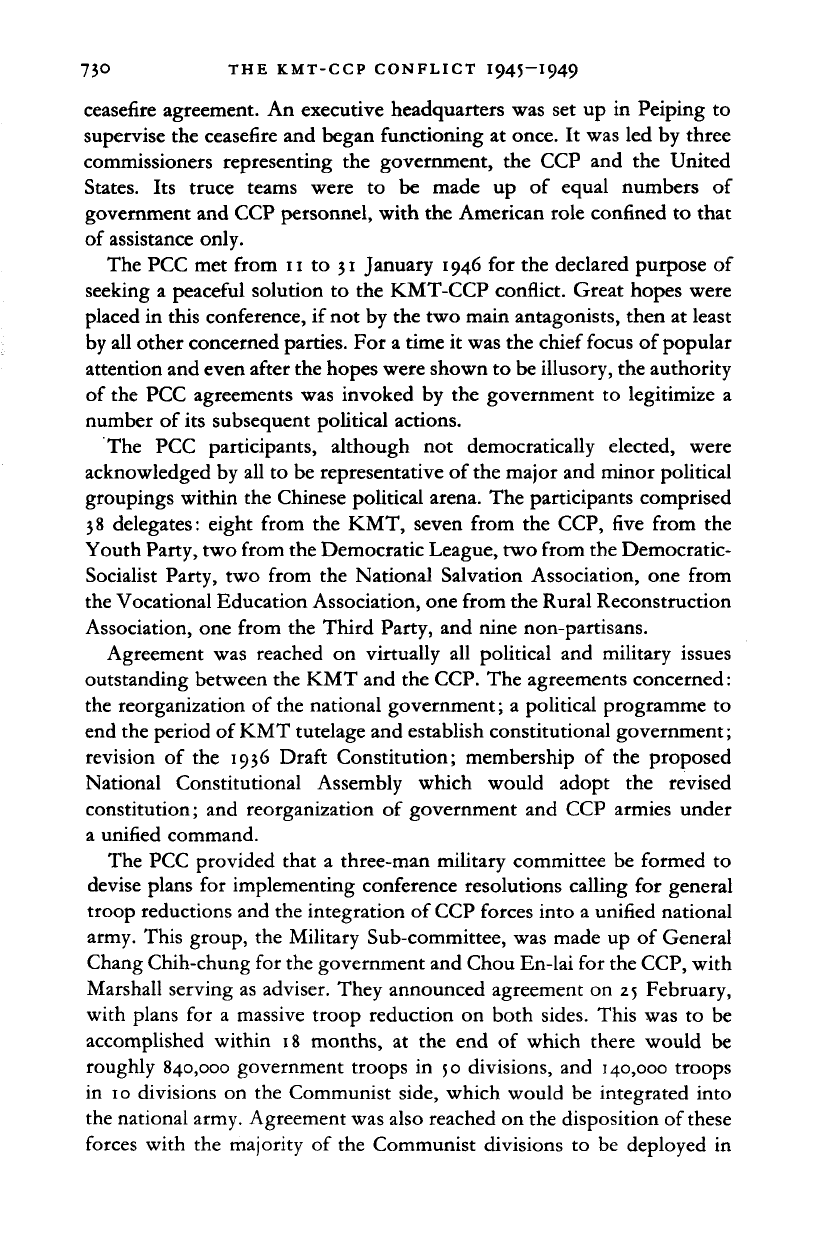
73°
THE KMT-CCP CONFLICT
I945-I949
ceasefire agreement. An executive headquarters was set up in Peiping to
supervise the ceasefire and began functioning at once. It was led by three
commissioners representing the government, the CCP and the United
States.
Its truce teams were to be made up of equal numbers of
government and
CCP
personnel, with the American role confined to that
of assistance only.
The PCC
met from n to 31 January 1946 for the declared purpose of
seeking a peaceful solution to the
KMT-CCP
conflict.
Great
hopes were
placed in this conference, if not by the two main antagonists, then at least
by
all other concerned parties. For a time it was the chief focus of popular
attention and even after the hopes were shown to be illusory, the authority
of the PCC agreements was invoked by the government to legitimize a
number of its subsequent political actions.
The
PCC participants, although not democratically elected, were
acknowledged
by all to be representative of the major and minor political
groupings within the Chinese political arena. The participants comprised
38
delegates: eight from the KMT, seven from the
CCP,
five from the
Youth
Party,
two from the Democratic
League,
two from the Democratic-
Socialist
Party,
two from the National Salvation Association, one from
the Vocational Education Association, one from the
Rural
Reconstruction
Association, one from the
Third
Party,
and
nine
non-partisans.
Agreement
was reached on virtually all political and military
issues
outstanding between the KMT and the
CCP.
The agreements concerned:
the reorganization of the national government; a political programme to
end the period of
KMT
tutelage and establish constitutional government;
revision of the 1936 Draft Constitution; membership of the proposed
National
Constitutional Assembly which would adopt the revised
constitution; and reorganization of government and CCP armies under
a unified command.
The
PCC provided that a three-man military committee be formed to
devise plans for implementing conference resolutions calling for general
troop reductions and the integration of
CCP
forces into a unified national
army.
This group, the Military Sub-committee, was made up of General
Chang
Chih-chung for the government and
Chou
En-lai for the
CCP,
with
Marshall
serving as adviser.
They
announced agreement on 25 February,
with plans for a massive troop reduction on both sides. This was to be
accomplished within 18 months, at the end of which there would be
roughly
840,000 government troops in 50 divisions, and
140,000
troops
in 10 divisions on the Communist side, which would be integrated into
the national army. Agreement was
also
reached on the disposition of
these
forces with the majority of the Communist divisions to be deployed in
Cambridge Histories Online © Cambridge University Press, 2008
